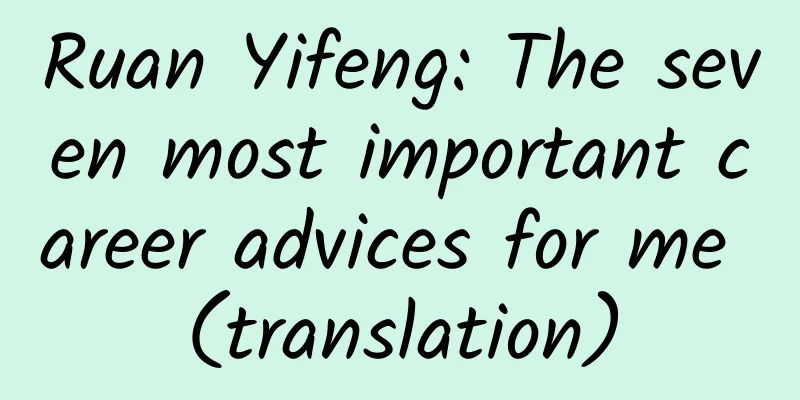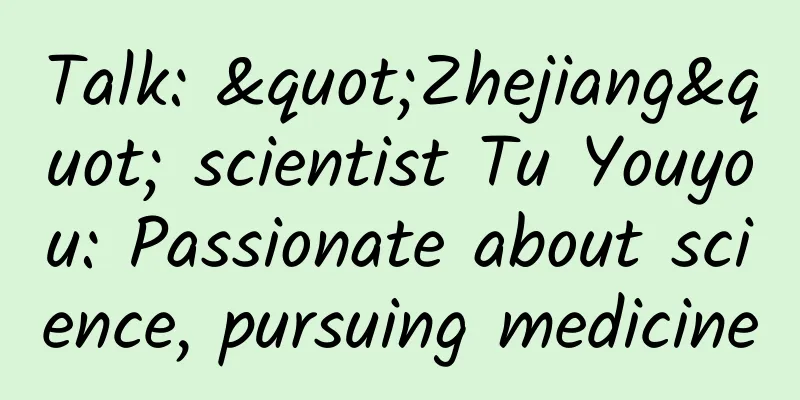Ruan Yifeng: The seven most important career advices for me (translation)

|
Nicholas C. Zakas is one of the best JavaScript programmers in the world. Two years ago, he wrote a long article looking back on his career and mentioning the seven most important pieces of advice for him.
I was so inspired by the article that I decided to make a few excerpts. You can read the abridged version below before reading the full article. Seven pieces of career advice that worked for me (short version) By Nicholas C. Zakas Translator: Ruan Yifeng Original URL: https://www.nczonline.net/blog/2013/10/15/the-best-career-advice-ive-received/ 1. Don’t do what others ask you to do. I worked at my first job for only 8 months before the company went bankrupt. I asked my manager what I should do next and he said:
I learned that it’s not enough to just implement a product, you have to be involved in deciding how to implement it. Good engineers don’t just follow orders, they give feedback and help the product owner improve it. 2. Sell Yourself After I joined Yahoo, my manager talked to me one day and he felt that I was not doing enough.
I realized that even if you do a good job, it's useless if no one else knows about it. Being an engineer who quietly codes in a corner is not advisable. Your manager will support you, but he can't promote you. Others in the company need to understand your value, and the best way to do that is to tell others what you have done. A simple email: "Hi, I have completed XXX, please tell me your ideas" works very well. 3. Learn to lead a team After working for a few years, no one doubted my technical ability. Everyone knew that I could write high-quality and reliable code. Once, I asked my supervisor how to get a promotion. He said:
Then I realized that what I lacked was leadership ability, how to lead a team and work effectively with others to achieve greater results. 4. Life is the most important thing There was a time when I was very frustrated at Yahoo! and I disagreed with some of the company's practices and often got angry at others. I asked a colleague how he could stay calm about this kind of thing, and he replied:
From then on, I separated work from life and only regarded it as a "work problem". In this way, I can always be calm about work and communicate with others more smoothly. 5. Find your own path After I was promoted to a supervisor, I didn't know what to do. I asked my superior, and he replied:
Many engineers have not completed this transformation. If you can do it, it may mean that you have matured and learned to make choices. You can't spend your time on everything, you must find a focus. 6. Treat yourself as the master I have to attend many meetings every day, and in some meetings I have nothing to say. I told a friend that I didn’t know why I was attending this meeting and I had nothing to contribute. He said:
From that time on, I never went into a meeting without saying anything. I made sure to only attend those meetings where I was needed. 7. Find someone with a higher level of skill ***, let me give my readers a suggestion based on my own experience.
(over) |
<<: The victory of "beating" Cook and the mediocre people are complacent about
Recommend
The love-hate relationship between parasites and hosts: plants also have their own tricks
Produced by: Science Popularization China Author:...
When operating Douyin, you must avoid 3 types of data traps
With the increasing popularity of short videos, m...
Is Hon Hai anxious after failing to complete the acquisition of Sharp in June?
According to the Nikkei News, Hon Hai was unable ...
What is it like to develop Android projects with Kotlin?
Preface From learning Kotlin, to writing some tri...
Sky-high prices for sports event copyrights: Is the pay-per-view model the ultimate weapon?
Tencent paid 500 million US dollars for the exclu...
Evolution Classroom "Practical Course on How to Sell Good Products on Douyin"
Evolution Classroom "Douyin Good Product Sal...
Recently, it has been a high incidence! Someone was suddenly "slashed" while riding a bicycle? The "culprit" turned out to be a common spring activity...
In March, the spring breeze is like smoke, the te...
Audi pledges to make diesel cheating investigation public
According to foreign media reports, at Audi's...
Rumor has it that the dual-camera iPhone 7 has a high-end name: iPhone Pro
Although it may not be released until September, ...
There will be heavy to torrential rain in northern Hubei and other places. Which areas will be affected by the torrential rain?
There will be heavy to torrential rain in norther...
The calm before the outbreak? Comprehensive thinking about "Mini Programs"
Since WeChat announced the upcoming release of Mi...
IEA: Path to a new era of nuclear energy
The IEA has released a new report, “The Road to a...
51CTO Exclusive: In-depth analysis of the mystery of Ctrip’s database crash
Perhaps no one knows that Edison invented the bat...
Without it, our life will be difficult!
On July 8, 1986, my country's domestic satell...
Practical tips for operators and promoters: practical SEO optimization and promotion plans!
I believe that many friends who are new to SEO wi...









